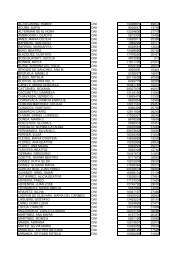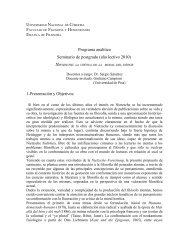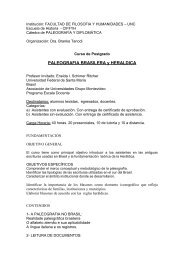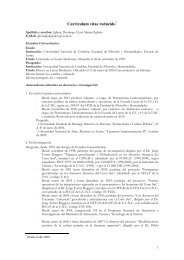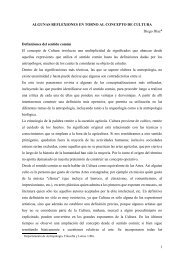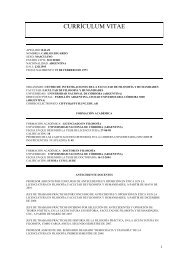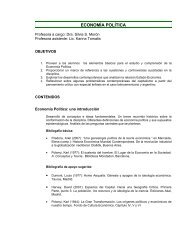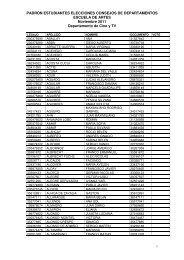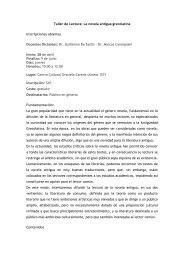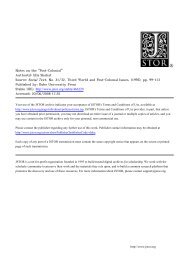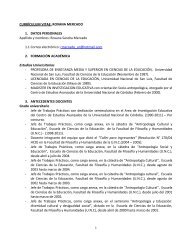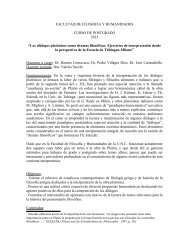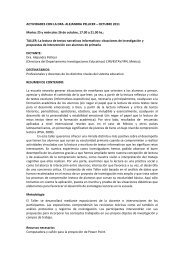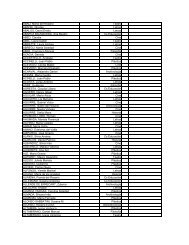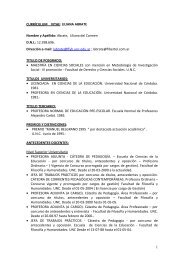Primer esbozo del proyecto para una reunión de trabajo para la ...
Primer esbozo del proyecto para una reunión de trabajo para la ...
Primer esbozo del proyecto para una reunión de trabajo para la ...
Create successful ePaper yourself
Turn your PDF publications into a flip-book with our unique Google optimized e-Paper software.
Virtual don<strong>de</strong> en general sucedía lo contrario. Mediante ese control, el usuario pue<strong>de</strong> ejercitar su<br />
capacidad <strong>para</strong> mo<strong><strong>de</strong>l</strong>ar universos electrónicos, estableciendo un diálogo productivo con el entorno<br />
tecnológico.<br />
METODOLOGÍA DE TRABAJO Y EVALUACIÓN<br />
La metodología <strong>de</strong> <strong>trabajo</strong> se realiza mediante <strong>la</strong> consulta <strong>de</strong> los contenidos que se encuentran en el<br />
campus virtual <strong>de</strong> <strong>la</strong> especialización.<br />
Los procesos <strong>de</strong> evaluación <strong><strong>de</strong>l</strong> curso se realizan mediante el uso <strong>de</strong> ―Múltiple-choice‖. Se confeccionan<br />
cuestionarios <strong>de</strong> opción múltiple <strong>para</strong> que cada alumno vaya completándolo <strong>de</strong> manera individual y<br />
online. De esta manera, cada c<strong>la</strong>se tiene su cuestionario, el cual alumno <strong>de</strong>berá respon<strong>de</strong>rlo, teniendo<br />
<strong>una</strong> cierta cantidad <strong>de</strong> intentos <strong>para</strong> resolver <strong>la</strong>s preguntas solicitadas. Las dudas que el alumno tenga<br />
sobre los puntos <strong>de</strong> <strong>la</strong> evaluación, como <strong>de</strong> los mismos contenidos, podrá consultar<strong>la</strong>s en <strong>la</strong>s horas <strong>de</strong><br />
tutoría.<br />
Al finalizar el módulo a distancia se realizará <strong>una</strong> evaluación final integradora por escrito, que<br />
consistirá en <strong>la</strong> redacción <strong>de</strong> un ensayo sobre temas abordados sobre Los cursos. Se apuntará<br />
a que <strong>la</strong>s evaluaciones fomenten <strong>la</strong> capacidad <strong>de</strong> síntesis, <strong>de</strong> reflexión y <strong>de</strong> comunicación <strong>de</strong><br />
<strong>la</strong>s i<strong>de</strong>as.<br />
BIBLIOGRAFÍA<br />
DARLEY, Andrew. Cultura Visual Digital. Espectáculo y Nuevos Géneros en los Medios <strong>de</strong><br />
Comunicación. Barcelona: Paidós, 2002.<br />
DRUCKREY, Timothy (ed). Ars Electronica. Facing the Future. Cambridge: The MIT Press, 1999.<br />
GIANNETTI, C<strong>la</strong>udia. Estética Digital. Barcelona: L‘Angelot, 2002.<br />
HAYWARD, Philip; WOLLEN, Tana (eds). Future Visions. New Technologies of the Screen. London:<br />
British Films Institute, 1993.<br />
HERNÁNDEZ GARCÍA, Iliana. Mundos Virtuales Habitados. Espacios Electrónicos Interactivos. Bogotá:<br />
CEJA, 2002.<br />
HERSHMAN LEESON, Lynn (ed). Clicking In. Hot Links to a Digital Culture. Seattle: Bay Press, 1996.<br />
LUNENFELD, Peter (ed). The Digital Dialectic. New Essays on New Media. Cambridge: The MIT Press,<br />
2000.<br />
MANOVICH, Lev. The Language of New Media. Cambridge: The MIT Press, 2001.<br />
MOSER, Mary Anne (ed). Immersed in Technology. Art and Virtual Environments. Cambridge: The MIT<br />
Press, 1996.<br />
PENNY, Simon (ed). Critical Issues in Electronic Media. New York: State University of New York Press,<br />
1995.



